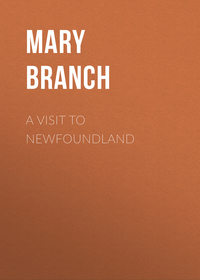Raamatut ei saa failina alla laadida, kuid seda saab lugeda meie rakenduses või veebis.
Loe raamatut: «A Visit to Newfoundland»
A Visit to Newfoundland
I know where there is a poppy-bed by a broken fence, and a house belonging to the poppy-bed, where old Mrs. Pike lives. Mrs. Pike can neither read nor write, but she commands respect, and her face is eloquent with the wisdom of many years. I know a little one-roomed cottage where Jim Savery’s wife rears her children. The chairs are rough-hewn by hand and the legs are unequal. Jim is a fisherman, like all his neighbors, and his cod lie drying on the frames outside.
I know a tumble-down gray house, sixty years old, whose owner will never again repair it, but will live in it until it falls. He has a boy of twelve who gets up before light to study his lessons, when he hears his father going out to his nets. Once his father drifted in a small boat three days and nights, among the ice floes, in a dense fog, without food or water. The man with him died of the cold and lay frozen stiff in the bottom of the boat. All night long, before that man died, he lay beside him in the boat, clasping him in his arms, trying to keep the vital spark.
I know where a wooden cross stands in memory of a clergyman who went in a storm to visit a sick man on an island near the coast. He promised his wife he would return that night, and he started home, but perished in the sea.
I know the way over the sharp rocks two miles to “Mother Legg’s Brook,” where are, perhaps, four little dwellings. Why any one should choose to build there is inexplicable. Why they remain is not so puzzling; they are too poor to move.
These things come before me in pictures as I recall Newfoundland. Again I breathe the clear, cold, exhilarating air and tread the flinty roads.
We had come up through beautiful Cape Breton Island, with its rich meadows, orchards and forests of pine, and its far-reaching, wonderful Bras D’Or Lakes. It was a dark night and raining hard when we reached North Sydney and stepped on board the steamer “Bruce”, which seemed to fold strong arms around us as she carried us through the great rolling billows, over a hundred miles of ocean.
But the morning was clear, and a rocky shore loomed up before us-the Newfoundland of our dreams!
The white rocks were almost dazzling in the sunshine, with scant herbage in the crevices, and here and there where foothold could be found a fisherman’s cottage perched like a bird resting in its flight. The air was crystal clear, and the sky the bluest ever seen. We glided into a harbor which wound like a river between jagged precipices, and then the “Bruce” reached her wharf, and all the passengers but three hastened to board the train for St. John’s.
A twenty minutes’ walk along a rugged path, much of it the exposed surface of solid rock, brought us to Channel, a typical fishing village, like which there are scores along the deeply indented coast of Newfoundland.
It is said that Newfoundland resembles Norway. Its deep bays, guarded by lofty cliffs, are like the Norwegian fiords. Some of these bays run inland eighty or ninety miles, with the wildest and grandest of scenery. In the interior of the island are boundless forests of pine, fir, spruce and birch. They are almost entirely untraversed, though the railroad passes through them, and hunters camp by the lakes. Many of the interior stations set down on the railroad map consist, we were told, only of a platform and a pine tree or a telegraph pole.
On the western side are mountain ranges clothed with evergreens and maples, and between those and the Gulf are fertile farm lands.
